A Comprehensive Report on Quality Management in Health and Social Care
VerifiedAdded on 2023/01/12
|15
|5195
|44
Report
AI Summary
This report provides a critical analysis of quality management in health and social care, emphasizing the importance of achieving the best outcomes for service users. It examines the need for effective teamwork, illustrated through a case study highlighting the impact of coordinated care. The report delves into outcome-based healthcare, discussing its advantages and challenges, and explores strategies for continuous quality improvement, including the role of performance teams. Furthermore, it investigates strategies for developing, maintaining, and evaluating systems and structures to support service users, offering insights into addressing potential downfalls and ensuring patient-centered care within healthcare settings. The report also highlights the importance of quality management in maintaining effectiveness and safety within healthcare organizations.
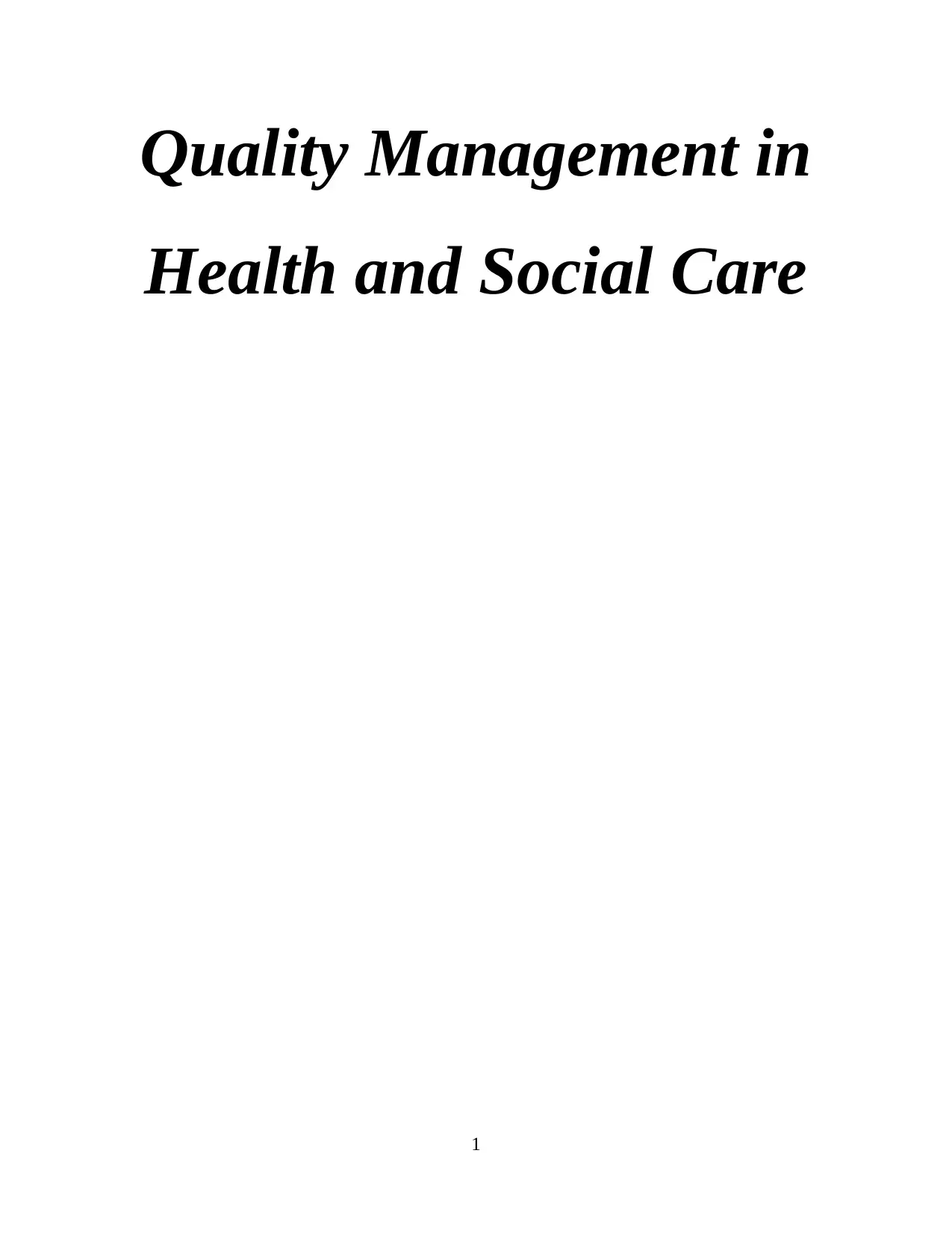
Quality Management in
Health and Social Care
1
Health and Social Care
1
Paraphrase This Document
Need a fresh take? Get an instant paraphrase of this document with our AI Paraphraser
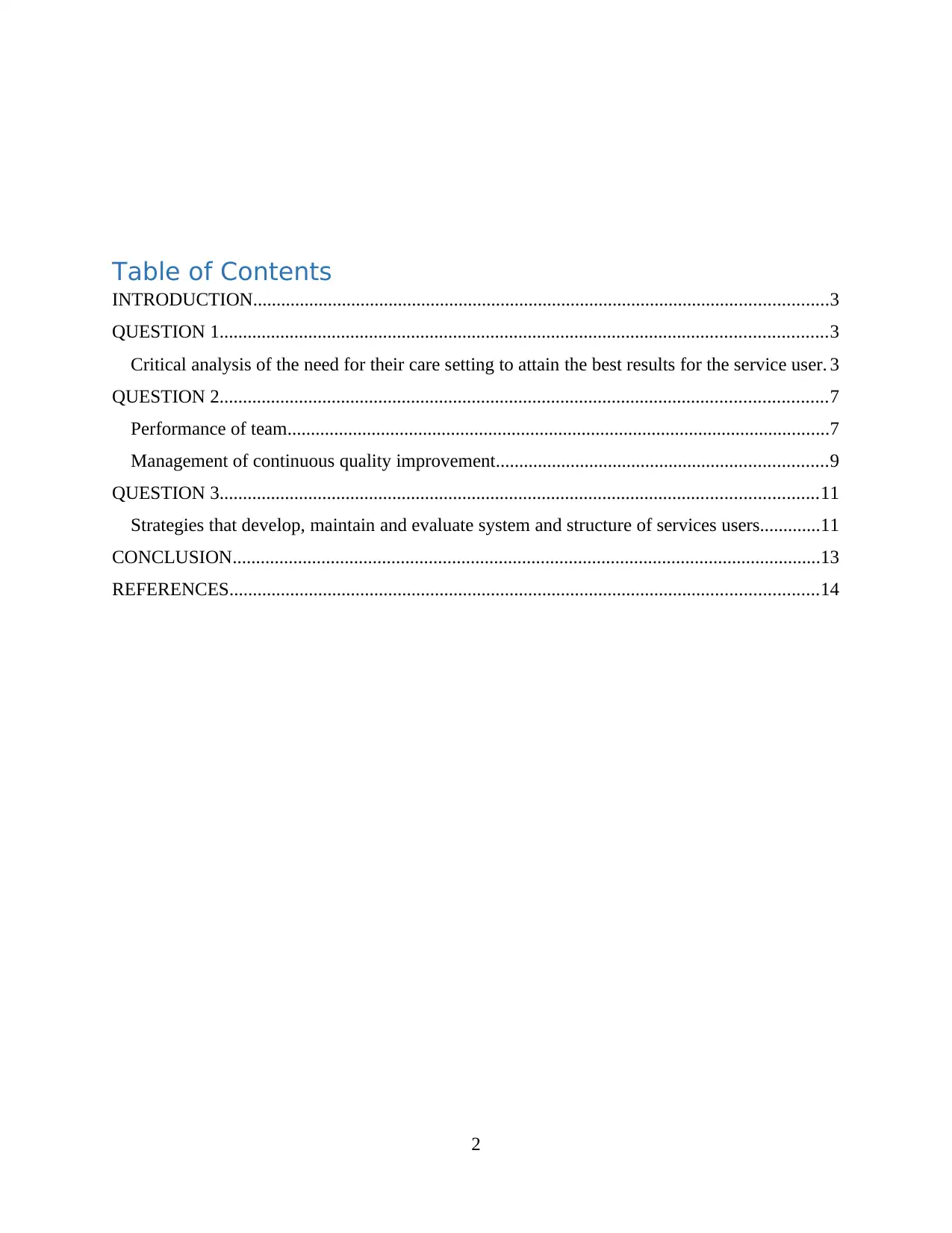
Table of Contents
INTRODUCTION...........................................................................................................................3
QUESTION 1..................................................................................................................................3
Critical analysis of the need for their care setting to attain the best results for the service user. 3
QUESTION 2..................................................................................................................................7
Performance of team....................................................................................................................7
Management of continuous quality improvement.......................................................................9
QUESTION 3................................................................................................................................11
Strategies that develop, maintain and evaluate system and structure of services users.............11
CONCLUSION..............................................................................................................................13
REFERENCES..............................................................................................................................14
2
INTRODUCTION...........................................................................................................................3
QUESTION 1..................................................................................................................................3
Critical analysis of the need for their care setting to attain the best results for the service user. 3
QUESTION 2..................................................................................................................................7
Performance of team....................................................................................................................7
Management of continuous quality improvement.......................................................................9
QUESTION 3................................................................................................................................11
Strategies that develop, maintain and evaluate system and structure of services users.............11
CONCLUSION..............................................................................................................................13
REFERENCES..............................................................................................................................14
2
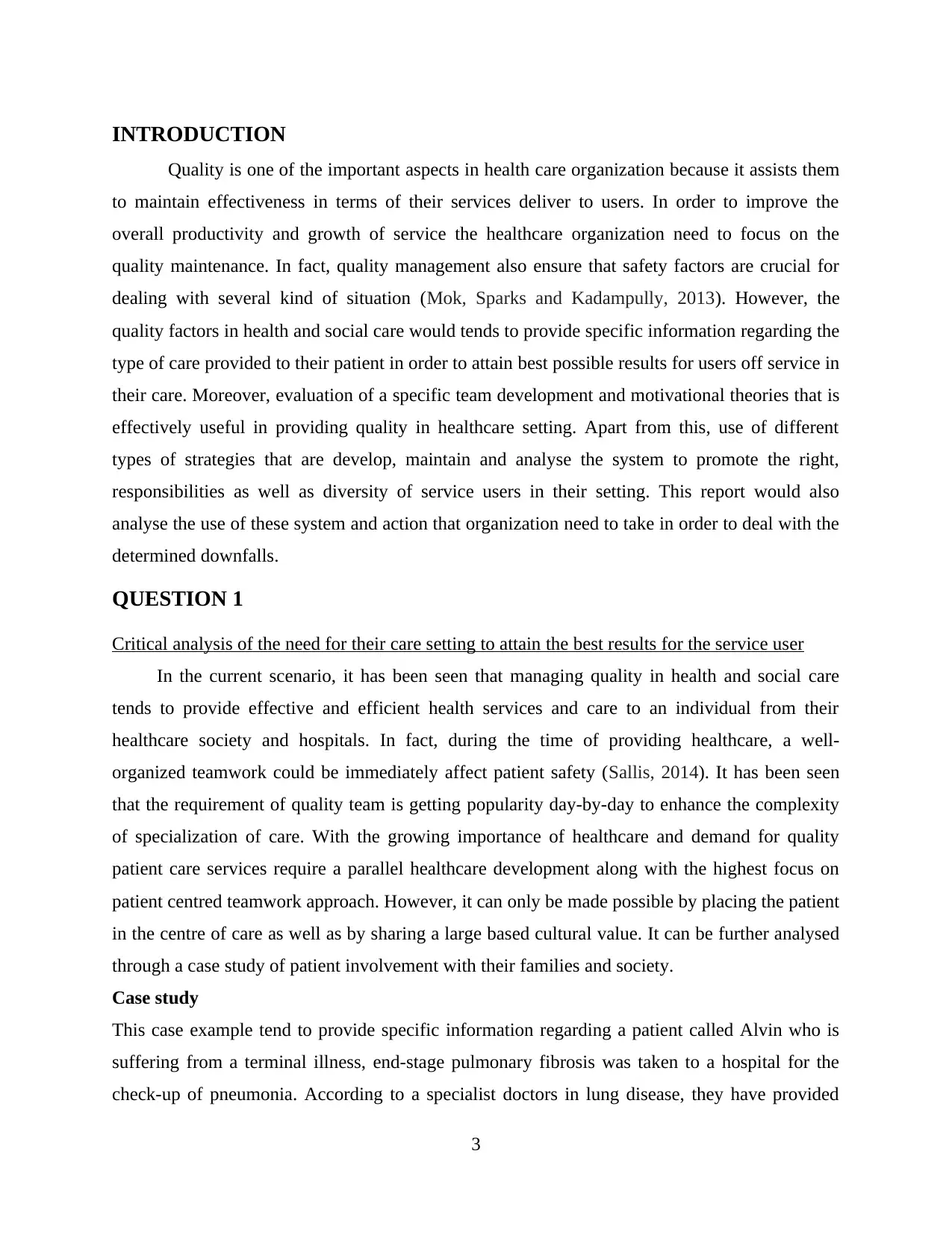
INTRODUCTION
Quality is one of the important aspects in health care organization because it assists them
to maintain effectiveness in terms of their services deliver to users. In order to improve the
overall productivity and growth of service the healthcare organization need to focus on the
quality maintenance. In fact, quality management also ensure that safety factors are crucial for
dealing with several kind of situation (Mok, Sparks and Kadampully, 2013). However, the
quality factors in health and social care would tends to provide specific information regarding the
type of care provided to their patient in order to attain best possible results for users off service in
their care. Moreover, evaluation of a specific team development and motivational theories that is
effectively useful in providing quality in healthcare setting. Apart from this, use of different
types of strategies that are develop, maintain and analyse the system to promote the right,
responsibilities as well as diversity of service users in their setting. This report would also
analyse the use of these system and action that organization need to take in order to deal with the
determined downfalls.
QUESTION 1
Critical analysis of the need for their care setting to attain the best results for the service user
In the current scenario, it has been seen that managing quality in health and social care
tends to provide effective and efficient health services and care to an individual from their
healthcare society and hospitals. In fact, during the time of providing healthcare, a well-
organized teamwork could be immediately affect patient safety (Sallis, 2014). It has been seen
that the requirement of quality team is getting popularity day-by-day to enhance the complexity
of specialization of care. With the growing importance of healthcare and demand for quality
patient care services require a parallel healthcare development along with the highest focus on
patient centred teamwork approach. However, it can only be made possible by placing the patient
in the centre of care as well as by sharing a large based cultural value. It can be further analysed
through a case study of patient involvement with their families and society.
Case study
This case example tend to provide specific information regarding a patient called Alvin who is
suffering from a terminal illness, end-stage pulmonary fibrosis was taken to a hospital for the
check-up of pneumonia. According to a specialist doctors in lung disease, they have provided
3
Quality is one of the important aspects in health care organization because it assists them
to maintain effectiveness in terms of their services deliver to users. In order to improve the
overall productivity and growth of service the healthcare organization need to focus on the
quality maintenance. In fact, quality management also ensure that safety factors are crucial for
dealing with several kind of situation (Mok, Sparks and Kadampully, 2013). However, the
quality factors in health and social care would tends to provide specific information regarding the
type of care provided to their patient in order to attain best possible results for users off service in
their care. Moreover, evaluation of a specific team development and motivational theories that is
effectively useful in providing quality in healthcare setting. Apart from this, use of different
types of strategies that are develop, maintain and analyse the system to promote the right,
responsibilities as well as diversity of service users in their setting. This report would also
analyse the use of these system and action that organization need to take in order to deal with the
determined downfalls.
QUESTION 1
Critical analysis of the need for their care setting to attain the best results for the service user
In the current scenario, it has been seen that managing quality in health and social care
tends to provide effective and efficient health services and care to an individual from their
healthcare society and hospitals. In fact, during the time of providing healthcare, a well-
organized teamwork could be immediately affect patient safety (Sallis, 2014). It has been seen
that the requirement of quality team is getting popularity day-by-day to enhance the complexity
of specialization of care. With the growing importance of healthcare and demand for quality
patient care services require a parallel healthcare development along with the highest focus on
patient centred teamwork approach. However, it can only be made possible by placing the patient
in the centre of care as well as by sharing a large based cultural value. It can be further analysed
through a case study of patient involvement with their families and society.
Case study
This case example tend to provide specific information regarding a patient called Alvin who is
suffering from a terminal illness, end-stage pulmonary fibrosis was taken to a hospital for the
check-up of pneumonia. According to a specialist doctors in lung disease, they have provided
3
⊘ This is a preview!⊘
Do you want full access?
Subscribe today to unlock all pages.

Trusted by 1+ million students worldwide
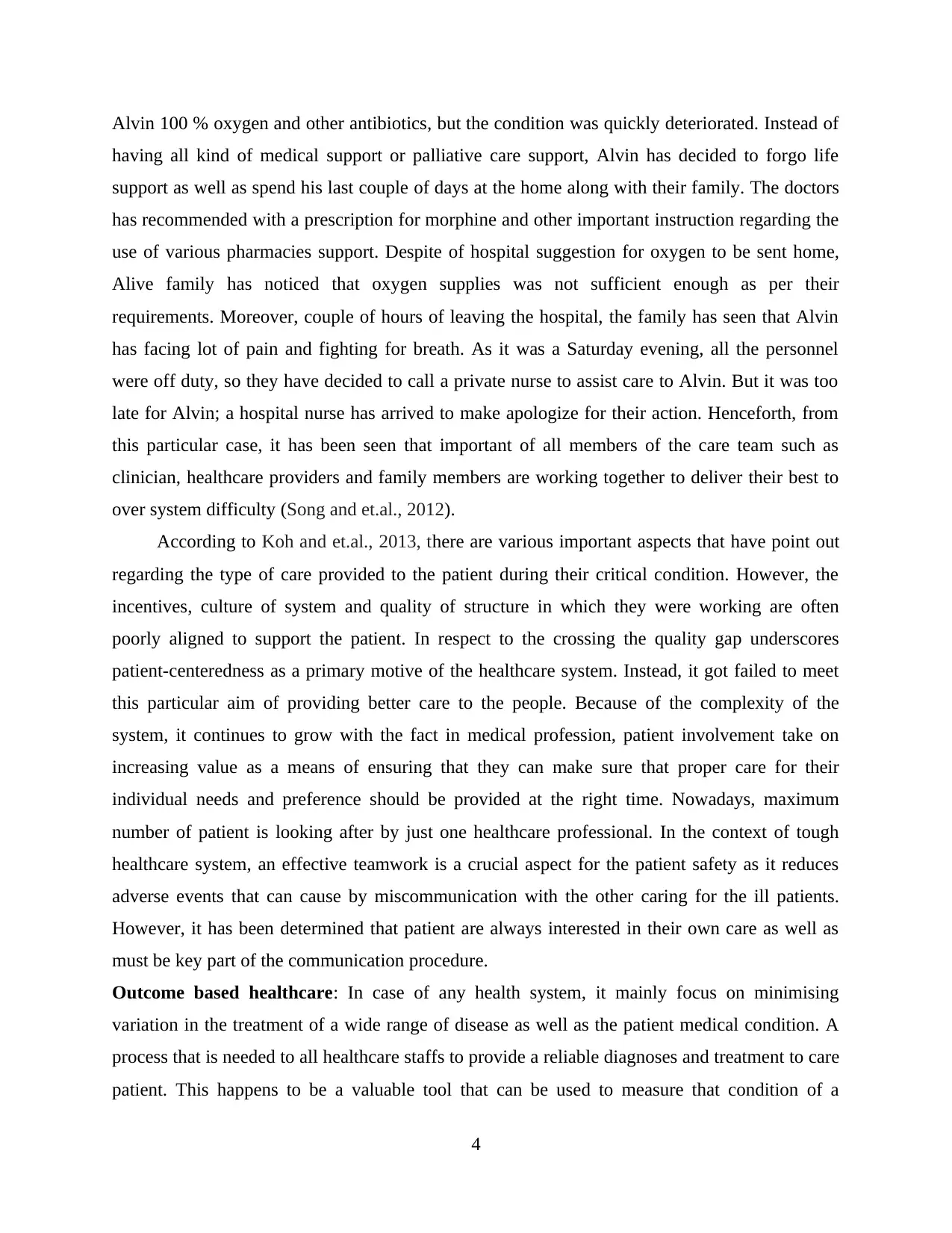
Alvin 100 % oxygen and other antibiotics, but the condition was quickly deteriorated. Instead of
having all kind of medical support or palliative care support, Alvin has decided to forgo life
support as well as spend his last couple of days at the home along with their family. The doctors
has recommended with a prescription for morphine and other important instruction regarding the
use of various pharmacies support. Despite of hospital suggestion for oxygen to be sent home,
Alive family has noticed that oxygen supplies was not sufficient enough as per their
requirements. Moreover, couple of hours of leaving the hospital, the family has seen that Alvin
has facing lot of pain and fighting for breath. As it was a Saturday evening, all the personnel
were off duty, so they have decided to call a private nurse to assist care to Alvin. But it was too
late for Alvin; a hospital nurse has arrived to make apologize for their action. Henceforth, from
this particular case, it has been seen that important of all members of the care team such as
clinician, healthcare providers and family members are working together to deliver their best to
over system difficulty (Song and et.al., 2012).
According to Koh and et.al., 2013, there are various important aspects that have point out
regarding the type of care provided to the patient during their critical condition. However, the
incentives, culture of system and quality of structure in which they were working are often
poorly aligned to support the patient. In respect to the crossing the quality gap underscores
patient-centeredness as a primary motive of the healthcare system. Instead, it got failed to meet
this particular aim of providing better care to the people. Because of the complexity of the
system, it continues to grow with the fact in medical profession, patient involvement take on
increasing value as a means of ensuring that they can make sure that proper care for their
individual needs and preference should be provided at the right time. Nowadays, maximum
number of patient is looking after by just one healthcare professional. In the context of tough
healthcare system, an effective teamwork is a crucial aspect for the patient safety as it reduces
adverse events that can cause by miscommunication with the other caring for the ill patients.
However, it has been determined that patient are always interested in their own care as well as
must be key part of the communication procedure.
Outcome based healthcare: In case of any health system, it mainly focus on minimising
variation in the treatment of a wide range of disease as well as the patient medical condition. A
process that is needed to all healthcare staffs to provide a reliable diagnoses and treatment to care
patient. This happens to be a valuable tool that can be used to measure that condition of a
4
having all kind of medical support or palliative care support, Alvin has decided to forgo life
support as well as spend his last couple of days at the home along with their family. The doctors
has recommended with a prescription for morphine and other important instruction regarding the
use of various pharmacies support. Despite of hospital suggestion for oxygen to be sent home,
Alive family has noticed that oxygen supplies was not sufficient enough as per their
requirements. Moreover, couple of hours of leaving the hospital, the family has seen that Alvin
has facing lot of pain and fighting for breath. As it was a Saturday evening, all the personnel
were off duty, so they have decided to call a private nurse to assist care to Alvin. But it was too
late for Alvin; a hospital nurse has arrived to make apologize for their action. Henceforth, from
this particular case, it has been seen that important of all members of the care team such as
clinician, healthcare providers and family members are working together to deliver their best to
over system difficulty (Song and et.al., 2012).
According to Koh and et.al., 2013, there are various important aspects that have point out
regarding the type of care provided to the patient during their critical condition. However, the
incentives, culture of system and quality of structure in which they were working are often
poorly aligned to support the patient. In respect to the crossing the quality gap underscores
patient-centeredness as a primary motive of the healthcare system. Instead, it got failed to meet
this particular aim of providing better care to the people. Because of the complexity of the
system, it continues to grow with the fact in medical profession, patient involvement take on
increasing value as a means of ensuring that they can make sure that proper care for their
individual needs and preference should be provided at the right time. Nowadays, maximum
number of patient is looking after by just one healthcare professional. In the context of tough
healthcare system, an effective teamwork is a crucial aspect for the patient safety as it reduces
adverse events that can cause by miscommunication with the other caring for the ill patients.
However, it has been determined that patient are always interested in their own care as well as
must be key part of the communication procedure.
Outcome based healthcare: In case of any health system, it mainly focus on minimising
variation in the treatment of a wide range of disease as well as the patient medical condition. A
process that is needed to all healthcare staffs to provide a reliable diagnoses and treatment to care
patient. This happens to be a valuable tool that can be used to measure that condition of a
4
Paraphrase This Document
Need a fresh take? Get an instant paraphrase of this document with our AI Paraphraser
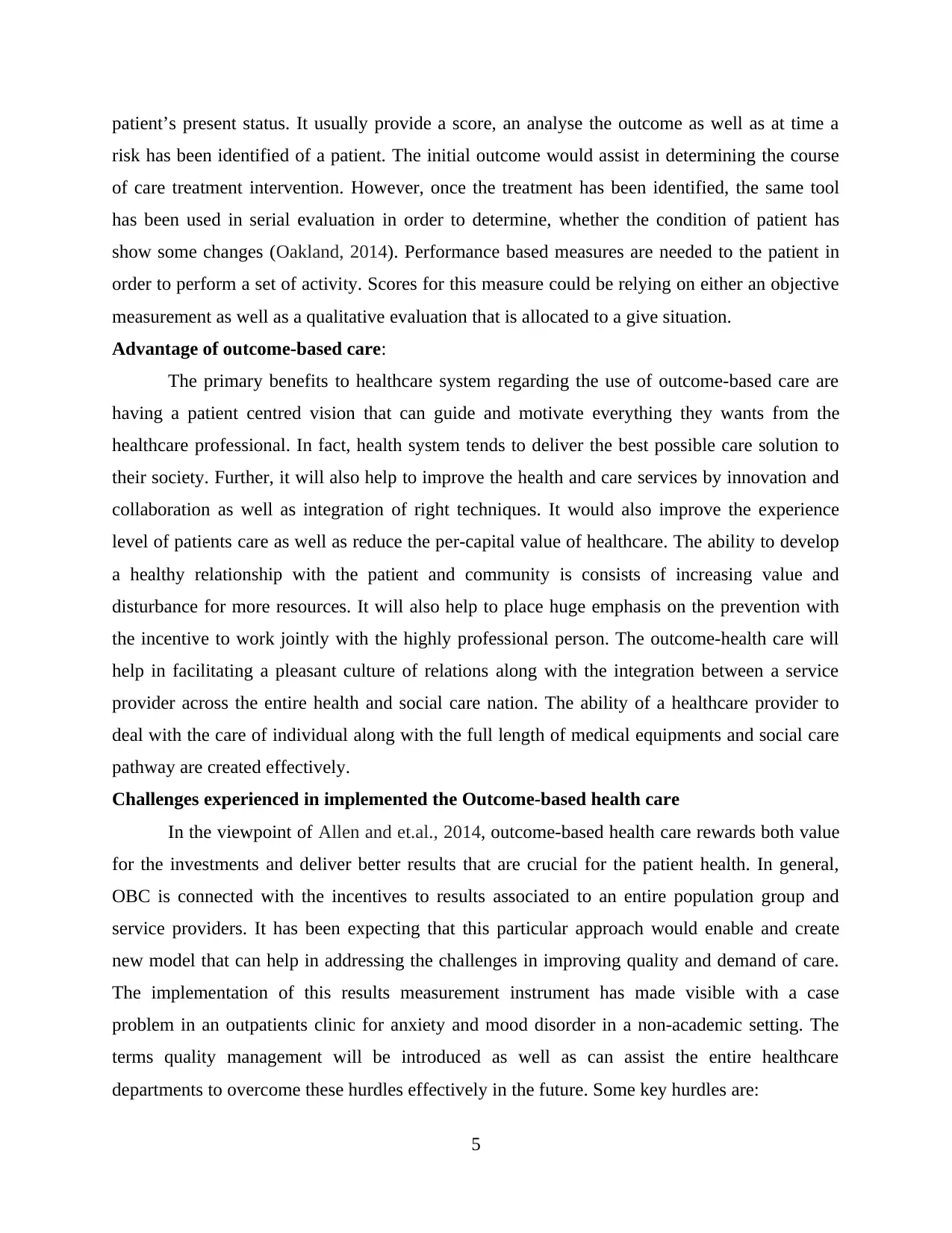
patient’s present status. It usually provide a score, an analyse the outcome as well as at time a
risk has been identified of a patient. The initial outcome would assist in determining the course
of care treatment intervention. However, once the treatment has been identified, the same tool
has been used in serial evaluation in order to determine, whether the condition of patient has
show some changes (Oakland, 2014). Performance based measures are needed to the patient in
order to perform a set of activity. Scores for this measure could be relying on either an objective
measurement as well as a qualitative evaluation that is allocated to a give situation.
Advantage of outcome-based care:
The primary benefits to healthcare system regarding the use of outcome-based care are
having a patient centred vision that can guide and motivate everything they wants from the
healthcare professional. In fact, health system tends to deliver the best possible care solution to
their society. Further, it will also help to improve the health and care services by innovation and
collaboration as well as integration of right techniques. It would also improve the experience
level of patients care as well as reduce the per-capital value of healthcare. The ability to develop
a healthy relationship with the patient and community is consists of increasing value and
disturbance for more resources. It will also help to place huge emphasis on the prevention with
the incentive to work jointly with the highly professional person. The outcome-health care will
help in facilitating a pleasant culture of relations along with the integration between a service
provider across the entire health and social care nation. The ability of a healthcare provider to
deal with the care of individual along with the full length of medical equipments and social care
pathway are created effectively.
Challenges experienced in implemented the Outcome-based health care
In the viewpoint of Allen and et.al., 2014, outcome-based health care rewards both value
for the investments and deliver better results that are crucial for the patient health. In general,
OBC is connected with the incentives to results associated to an entire population group and
service providers. It has been expecting that this particular approach would enable and create
new model that can help in addressing the challenges in improving quality and demand of care.
The implementation of this results measurement instrument has made visible with a case
problem in an outpatients clinic for anxiety and mood disorder in a non-academic setting. The
terms quality management will be introduced as well as can assist the entire healthcare
departments to overcome these hurdles effectively in the future. Some key hurdles are:
5
risk has been identified of a patient. The initial outcome would assist in determining the course
of care treatment intervention. However, once the treatment has been identified, the same tool
has been used in serial evaluation in order to determine, whether the condition of patient has
show some changes (Oakland, 2014). Performance based measures are needed to the patient in
order to perform a set of activity. Scores for this measure could be relying on either an objective
measurement as well as a qualitative evaluation that is allocated to a give situation.
Advantage of outcome-based care:
The primary benefits to healthcare system regarding the use of outcome-based care are
having a patient centred vision that can guide and motivate everything they wants from the
healthcare professional. In fact, health system tends to deliver the best possible care solution to
their society. Further, it will also help to improve the health and care services by innovation and
collaboration as well as integration of right techniques. It would also improve the experience
level of patients care as well as reduce the per-capital value of healthcare. The ability to develop
a healthy relationship with the patient and community is consists of increasing value and
disturbance for more resources. It will also help to place huge emphasis on the prevention with
the incentive to work jointly with the highly professional person. The outcome-health care will
help in facilitating a pleasant culture of relations along with the integration between a service
provider across the entire health and social care nation. The ability of a healthcare provider to
deal with the care of individual along with the full length of medical equipments and social care
pathway are created effectively.
Challenges experienced in implemented the Outcome-based health care
In the viewpoint of Allen and et.al., 2014, outcome-based health care rewards both value
for the investments and deliver better results that are crucial for the patient health. In general,
OBC is connected with the incentives to results associated to an entire population group and
service providers. It has been expecting that this particular approach would enable and create
new model that can help in addressing the challenges in improving quality and demand of care.
The implementation of this results measurement instrument has made visible with a case
problem in an outpatients clinic for anxiety and mood disorder in a non-academic setting. The
terms quality management will be introduced as well as can assist the entire healthcare
departments to overcome these hurdles effectively in the future. Some key hurdles are:
5
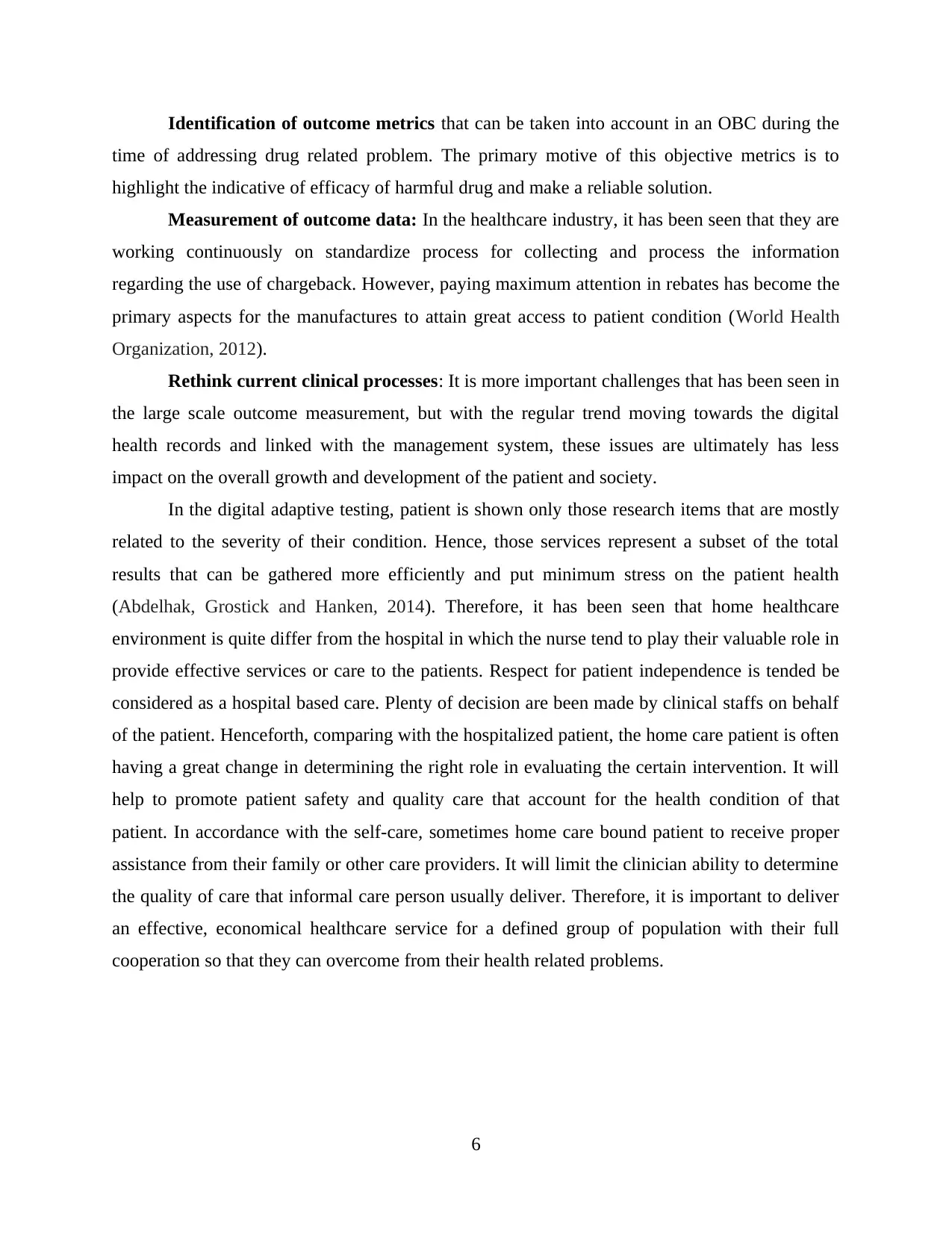
Identification of outcome metrics that can be taken into account in an OBC during the
time of addressing drug related problem. The primary motive of this objective metrics is to
highlight the indicative of efficacy of harmful drug and make a reliable solution.
Measurement of outcome data: In the healthcare industry, it has been seen that they are
working continuously on standardize process for collecting and process the information
regarding the use of chargeback. However, paying maximum attention in rebates has become the
primary aspects for the manufactures to attain great access to patient condition (World Health
Organization, 2012).
Rethink current clinical processes: It is more important challenges that has been seen in
the large scale outcome measurement, but with the regular trend moving towards the digital
health records and linked with the management system, these issues are ultimately has less
impact on the overall growth and development of the patient and society.
In the digital adaptive testing, patient is shown only those research items that are mostly
related to the severity of their condition. Hence, those services represent a subset of the total
results that can be gathered more efficiently and put minimum stress on the patient health
(Abdelhak, Grostick and Hanken, 2014). Therefore, it has been seen that home healthcare
environment is quite differ from the hospital in which the nurse tend to play their valuable role in
provide effective services or care to the patients. Respect for patient independence is tended be
considered as a hospital based care. Plenty of decision are been made by clinical staffs on behalf
of the patient. Henceforth, comparing with the hospitalized patient, the home care patient is often
having a great change in determining the right role in evaluating the certain intervention. It will
help to promote patient safety and quality care that account for the health condition of that
patient. In accordance with the self-care, sometimes home care bound patient to receive proper
assistance from their family or other care providers. It will limit the clinician ability to determine
the quality of care that informal care person usually deliver. Therefore, it is important to deliver
an effective, economical healthcare service for a defined group of population with their full
cooperation so that they can overcome from their health related problems.
6
time of addressing drug related problem. The primary motive of this objective metrics is to
highlight the indicative of efficacy of harmful drug and make a reliable solution.
Measurement of outcome data: In the healthcare industry, it has been seen that they are
working continuously on standardize process for collecting and process the information
regarding the use of chargeback. However, paying maximum attention in rebates has become the
primary aspects for the manufactures to attain great access to patient condition (World Health
Organization, 2012).
Rethink current clinical processes: It is more important challenges that has been seen in
the large scale outcome measurement, but with the regular trend moving towards the digital
health records and linked with the management system, these issues are ultimately has less
impact on the overall growth and development of the patient and society.
In the digital adaptive testing, patient is shown only those research items that are mostly
related to the severity of their condition. Hence, those services represent a subset of the total
results that can be gathered more efficiently and put minimum stress on the patient health
(Abdelhak, Grostick and Hanken, 2014). Therefore, it has been seen that home healthcare
environment is quite differ from the hospital in which the nurse tend to play their valuable role in
provide effective services or care to the patients. Respect for patient independence is tended be
considered as a hospital based care. Plenty of decision are been made by clinical staffs on behalf
of the patient. Henceforth, comparing with the hospitalized patient, the home care patient is often
having a great change in determining the right role in evaluating the certain intervention. It will
help to promote patient safety and quality care that account for the health condition of that
patient. In accordance with the self-care, sometimes home care bound patient to receive proper
assistance from their family or other care providers. It will limit the clinician ability to determine
the quality of care that informal care person usually deliver. Therefore, it is important to deliver
an effective, economical healthcare service for a defined group of population with their full
cooperation so that they can overcome from their health related problems.
6
⊘ This is a preview!⊘
Do you want full access?
Subscribe today to unlock all pages.

Trusted by 1+ million students worldwide
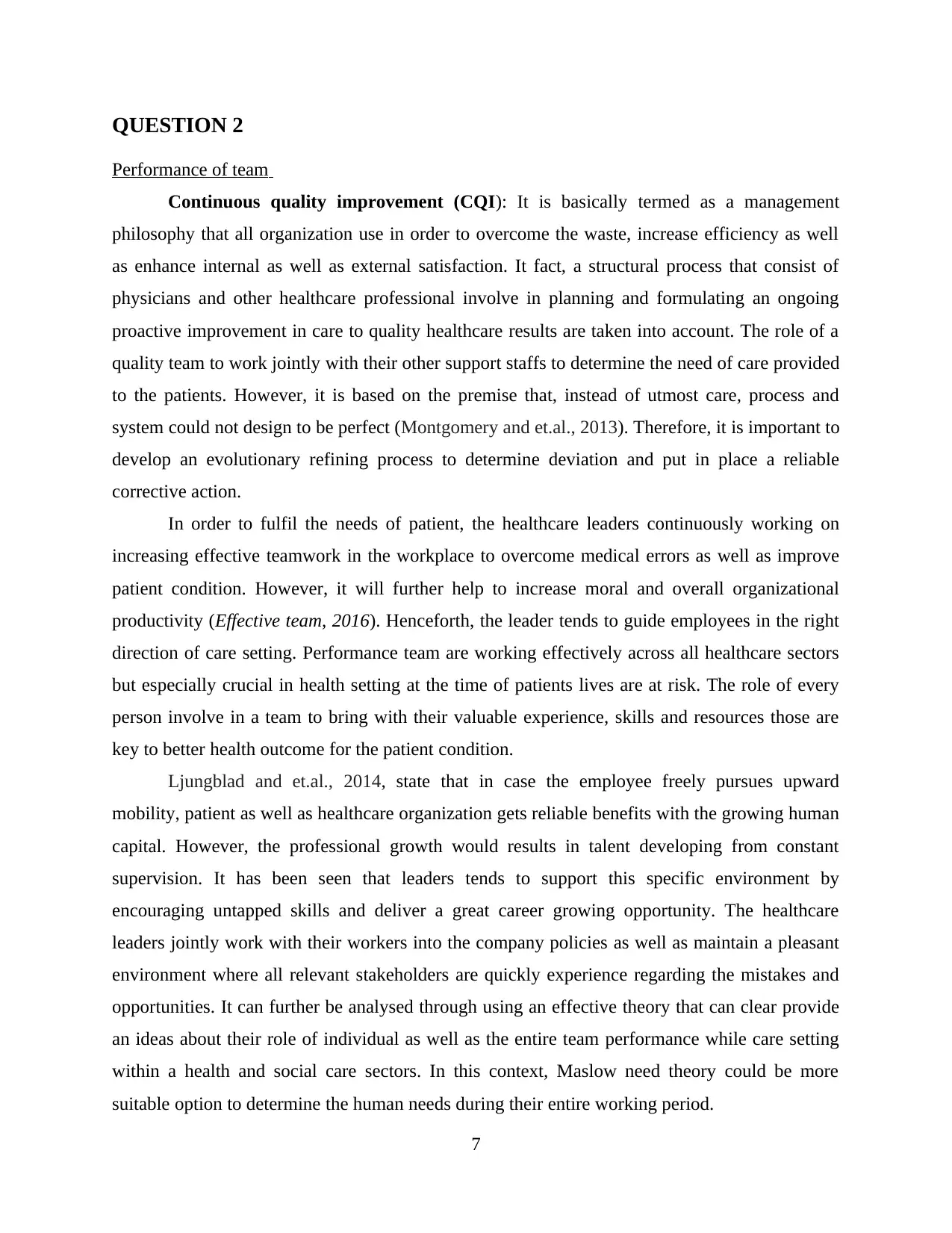
QUESTION 2
Performance of team
Continuous quality improvement (CQI): It is basically termed as a management
philosophy that all organization use in order to overcome the waste, increase efficiency as well
as enhance internal as well as external satisfaction. It fact, a structural process that consist of
physicians and other healthcare professional involve in planning and formulating an ongoing
proactive improvement in care to quality healthcare results are taken into account. The role of a
quality team to work jointly with their other support staffs to determine the need of care provided
to the patients. However, it is based on the premise that, instead of utmost care, process and
system could not design to be perfect (Montgomery and et.al., 2013). Therefore, it is important to
develop an evolutionary refining process to determine deviation and put in place a reliable
corrective action.
In order to fulfil the needs of patient, the healthcare leaders continuously working on
increasing effective teamwork in the workplace to overcome medical errors as well as improve
patient condition. However, it will further help to increase moral and overall organizational
productivity (Effective team, 2016). Henceforth, the leader tends to guide employees in the right
direction of care setting. Performance team are working effectively across all healthcare sectors
but especially crucial in health setting at the time of patients lives are at risk. The role of every
person involve in a team to bring with their valuable experience, skills and resources those are
key to better health outcome for the patient condition.
Ljungblad and et.al., 2014, state that in case the employee freely pursues upward
mobility, patient as well as healthcare organization gets reliable benefits with the growing human
capital. However, the professional growth would results in talent developing from constant
supervision. It has been seen that leaders tends to support this specific environment by
encouraging untapped skills and deliver a great career growing opportunity. The healthcare
leaders jointly work with their workers into the company policies as well as maintain a pleasant
environment where all relevant stakeholders are quickly experience regarding the mistakes and
opportunities. It can further be analysed through using an effective theory that can clear provide
an ideas about their role of individual as well as the entire team performance while care setting
within a health and social care sectors. In this context, Maslow need theory could be more
suitable option to determine the human needs during their entire working period.
7
Performance of team
Continuous quality improvement (CQI): It is basically termed as a management
philosophy that all organization use in order to overcome the waste, increase efficiency as well
as enhance internal as well as external satisfaction. It fact, a structural process that consist of
physicians and other healthcare professional involve in planning and formulating an ongoing
proactive improvement in care to quality healthcare results are taken into account. The role of a
quality team to work jointly with their other support staffs to determine the need of care provided
to the patients. However, it is based on the premise that, instead of utmost care, process and
system could not design to be perfect (Montgomery and et.al., 2013). Therefore, it is important to
develop an evolutionary refining process to determine deviation and put in place a reliable
corrective action.
In order to fulfil the needs of patient, the healthcare leaders continuously working on
increasing effective teamwork in the workplace to overcome medical errors as well as improve
patient condition. However, it will further help to increase moral and overall organizational
productivity (Effective team, 2016). Henceforth, the leader tends to guide employees in the right
direction of care setting. Performance team are working effectively across all healthcare sectors
but especially crucial in health setting at the time of patients lives are at risk. The role of every
person involve in a team to bring with their valuable experience, skills and resources those are
key to better health outcome for the patient condition.
Ljungblad and et.al., 2014, state that in case the employee freely pursues upward
mobility, patient as well as healthcare organization gets reliable benefits with the growing human
capital. However, the professional growth would results in talent developing from constant
supervision. It has been seen that leaders tends to support this specific environment by
encouraging untapped skills and deliver a great career growing opportunity. The healthcare
leaders jointly work with their workers into the company policies as well as maintain a pleasant
environment where all relevant stakeholders are quickly experience regarding the mistakes and
opportunities. It can further be analysed through using an effective theory that can clear provide
an ideas about their role of individual as well as the entire team performance while care setting
within a health and social care sectors. In this context, Maslow need theory could be more
suitable option to determine the human needs during their entire working period.
7
Paraphrase This Document
Need a fresh take? Get an instant paraphrase of this document with our AI Paraphraser
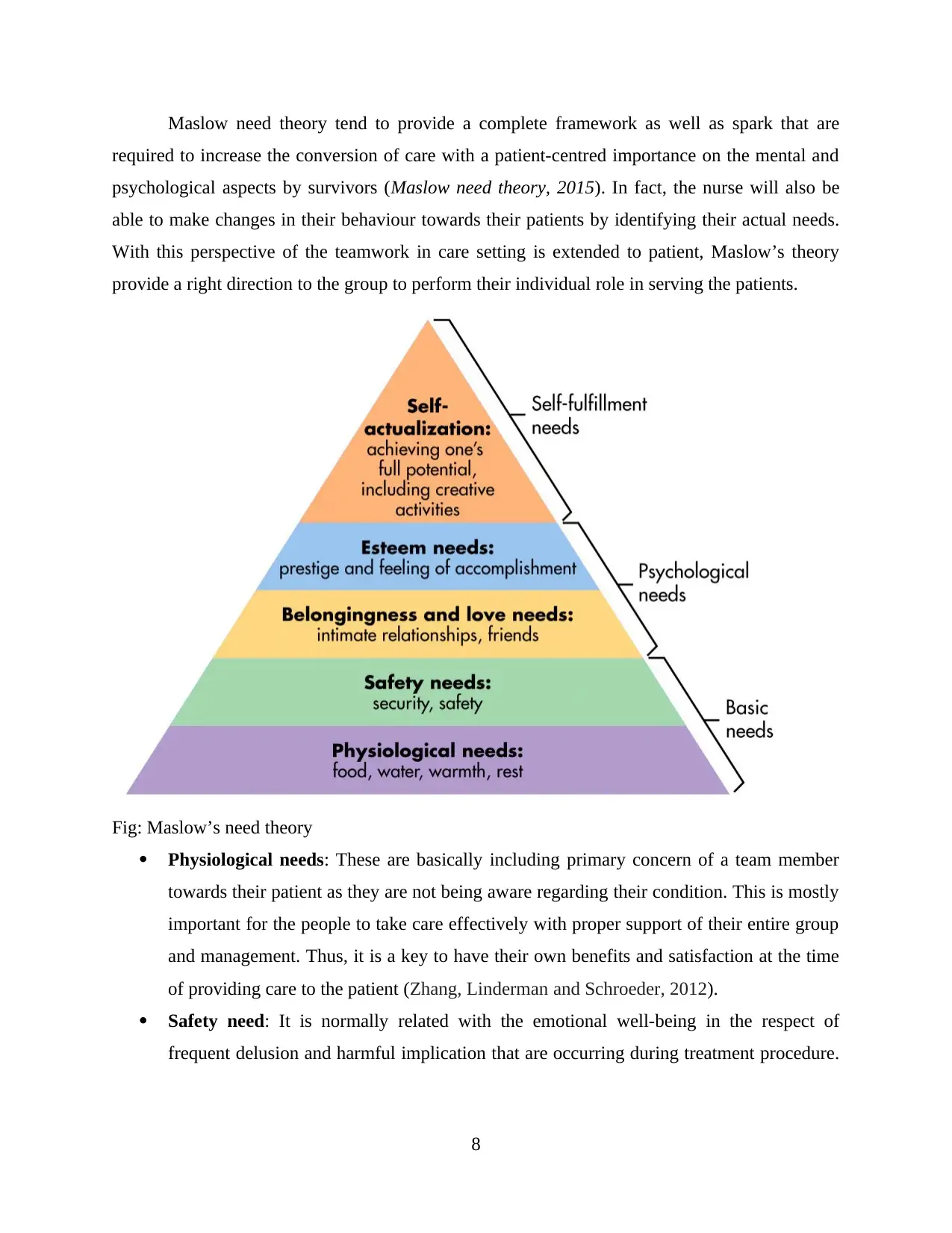
Maslow need theory tend to provide a complete framework as well as spark that are
required to increase the conversion of care with a patient-centred importance on the mental and
psychological aspects by survivors (Maslow need theory, 2015). In fact, the nurse will also be
able to make changes in their behaviour towards their patients by identifying their actual needs.
With this perspective of the teamwork in care setting is extended to patient, Maslow’s theory
provide a right direction to the group to perform their individual role in serving the patients.
Fig: Maslow’s need theory
Physiological needs: These are basically including primary concern of a team member
towards their patient as they are not being aware regarding their condition. This is mostly
important for the people to take care effectively with proper support of their entire group
and management. Thus, it is a key to have their own benefits and satisfaction at the time
of providing care to the patient (Zhang, Linderman and Schroeder, 2012).
Safety need: It is normally related with the emotional well-being in the respect of
frequent delusion and harmful implication that are occurring during treatment procedure.
8
required to increase the conversion of care with a patient-centred importance on the mental and
psychological aspects by survivors (Maslow need theory, 2015). In fact, the nurse will also be
able to make changes in their behaviour towards their patients by identifying their actual needs.
With this perspective of the teamwork in care setting is extended to patient, Maslow’s theory
provide a right direction to the group to perform their individual role in serving the patients.
Fig: Maslow’s need theory
Physiological needs: These are basically including primary concern of a team member
towards their patient as they are not being aware regarding their condition. This is mostly
important for the people to take care effectively with proper support of their entire group
and management. Thus, it is a key to have their own benefits and satisfaction at the time
of providing care to the patient (Zhang, Linderman and Schroeder, 2012).
Safety need: It is normally related with the emotional well-being in the respect of
frequent delusion and harmful implication that are occurring during treatment procedure.
8
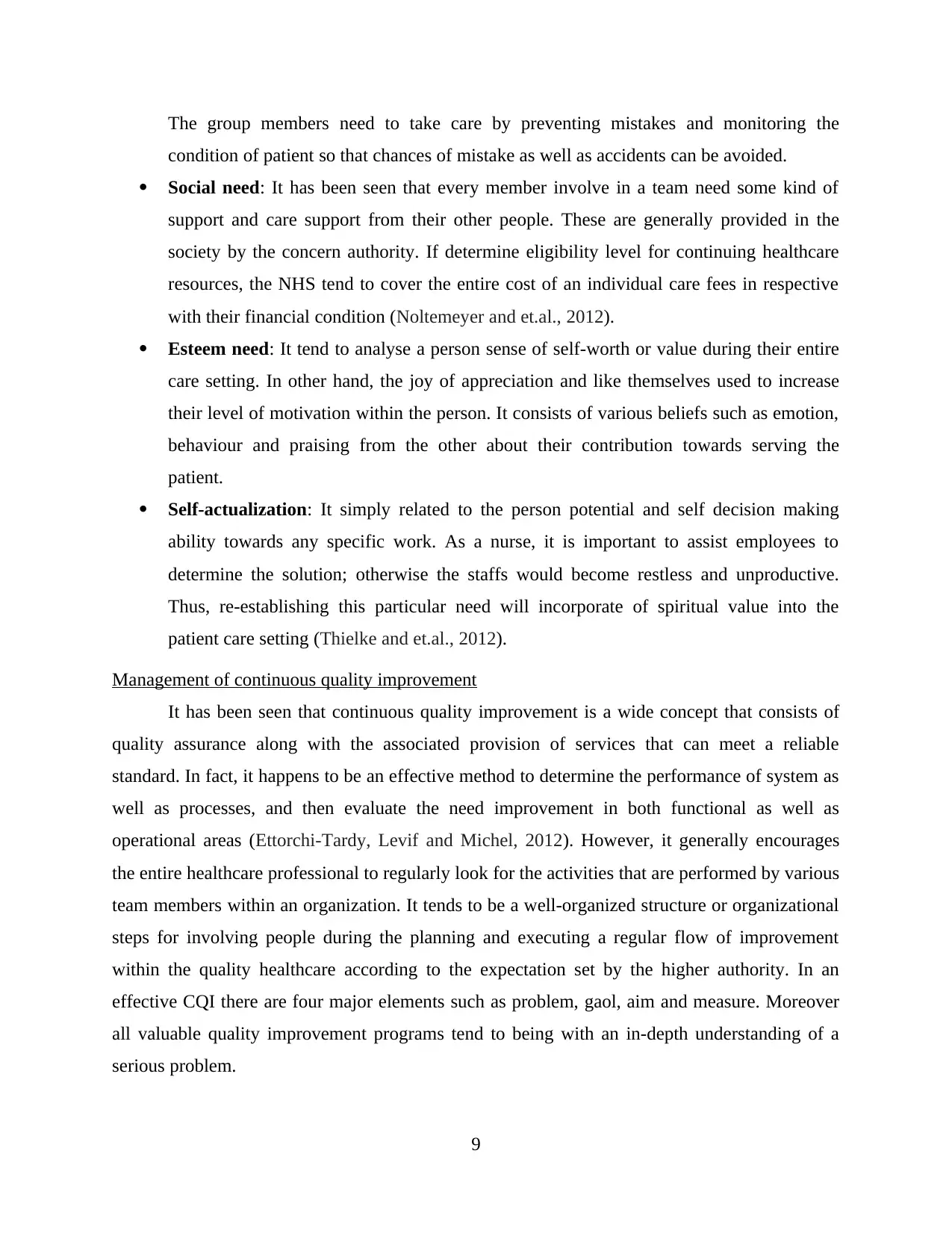
The group members need to take care by preventing mistakes and monitoring the
condition of patient so that chances of mistake as well as accidents can be avoided.
Social need: It has been seen that every member involve in a team need some kind of
support and care support from their other people. These are generally provided in the
society by the concern authority. If determine eligibility level for continuing healthcare
resources, the NHS tend to cover the entire cost of an individual care fees in respective
with their financial condition (Noltemeyer and et.al., 2012).
Esteem need: It tend to analyse a person sense of self-worth or value during their entire
care setting. In other hand, the joy of appreciation and like themselves used to increase
their level of motivation within the person. It consists of various beliefs such as emotion,
behaviour and praising from the other about their contribution towards serving the
patient.
Self-actualization: It simply related to the person potential and self decision making
ability towards any specific work. As a nurse, it is important to assist employees to
determine the solution; otherwise the staffs would become restless and unproductive.
Thus, re-establishing this particular need will incorporate of spiritual value into the
patient care setting (Thielke and et.al., 2012).
Management of continuous quality improvement
It has been seen that continuous quality improvement is a wide concept that consists of
quality assurance along with the associated provision of services that can meet a reliable
standard. In fact, it happens to be an effective method to determine the performance of system as
well as processes, and then evaluate the need improvement in both functional as well as
operational areas (Ettorchi-Tardy, Levif and Michel, 2012). However, it generally encourages
the entire healthcare professional to regularly look for the activities that are performed by various
team members within an organization. It tends to be a well-organized structure or organizational
steps for involving people during the planning and executing a regular flow of improvement
within the quality healthcare according to the expectation set by the higher authority. In an
effective CQI there are four major elements such as problem, gaol, aim and measure. Moreover
all valuable quality improvement programs tend to being with an in-depth understanding of a
serious problem.
9
condition of patient so that chances of mistake as well as accidents can be avoided.
Social need: It has been seen that every member involve in a team need some kind of
support and care support from their other people. These are generally provided in the
society by the concern authority. If determine eligibility level for continuing healthcare
resources, the NHS tend to cover the entire cost of an individual care fees in respective
with their financial condition (Noltemeyer and et.al., 2012).
Esteem need: It tend to analyse a person sense of self-worth or value during their entire
care setting. In other hand, the joy of appreciation and like themselves used to increase
their level of motivation within the person. It consists of various beliefs such as emotion,
behaviour and praising from the other about their contribution towards serving the
patient.
Self-actualization: It simply related to the person potential and self decision making
ability towards any specific work. As a nurse, it is important to assist employees to
determine the solution; otherwise the staffs would become restless and unproductive.
Thus, re-establishing this particular need will incorporate of spiritual value into the
patient care setting (Thielke and et.al., 2012).
Management of continuous quality improvement
It has been seen that continuous quality improvement is a wide concept that consists of
quality assurance along with the associated provision of services that can meet a reliable
standard. In fact, it happens to be an effective method to determine the performance of system as
well as processes, and then evaluate the need improvement in both functional as well as
operational areas (Ettorchi-Tardy, Levif and Michel, 2012). However, it generally encourages
the entire healthcare professional to regularly look for the activities that are performed by various
team members within an organization. It tends to be a well-organized structure or organizational
steps for involving people during the planning and executing a regular flow of improvement
within the quality healthcare according to the expectation set by the higher authority. In an
effective CQI there are four major elements such as problem, gaol, aim and measure. Moreover
all valuable quality improvement programs tend to being with an in-depth understanding of a
serious problem.
9
⊘ This is a preview!⊘
Do you want full access?
Subscribe today to unlock all pages.

Trusted by 1+ million students worldwide
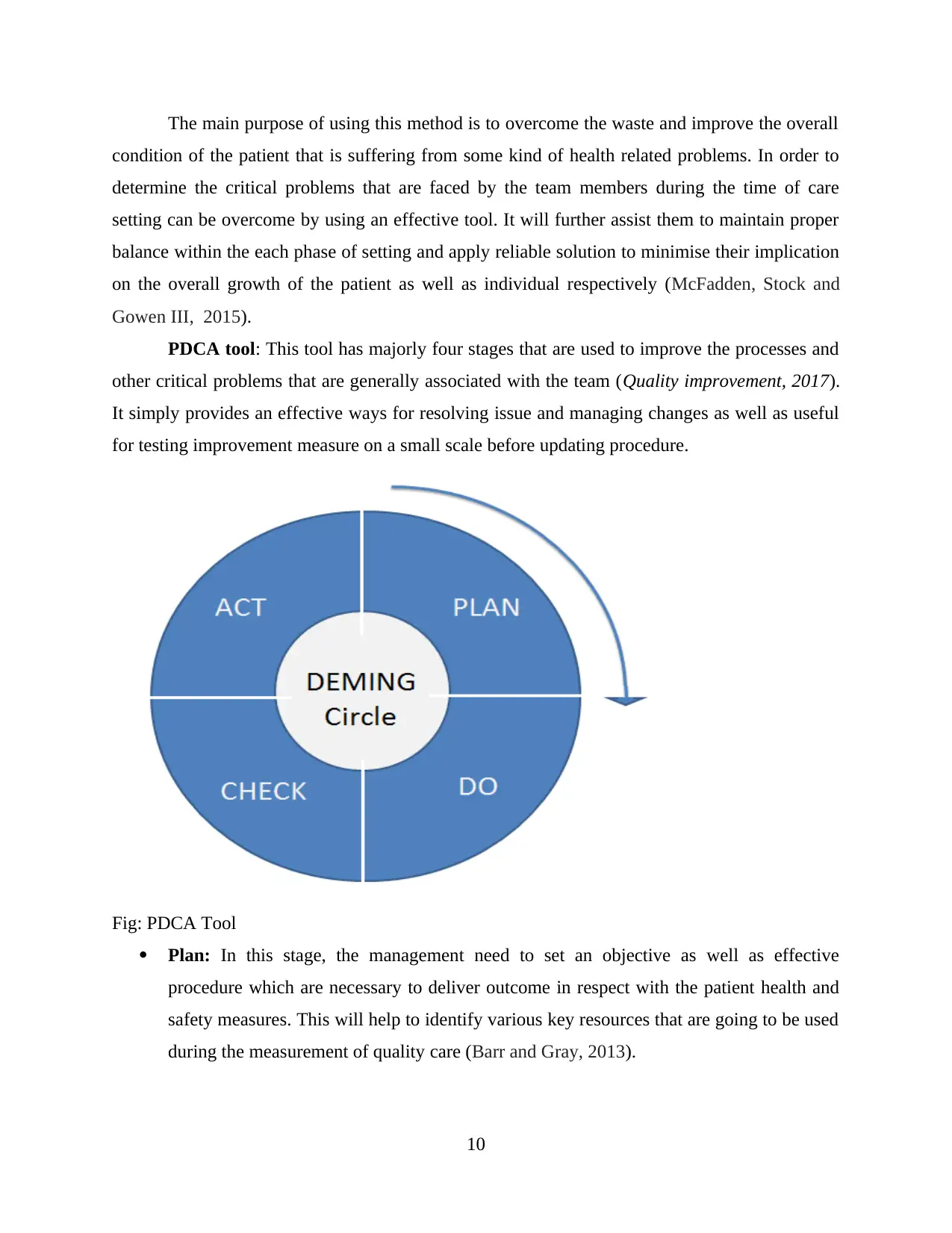
The main purpose of using this method is to overcome the waste and improve the overall
condition of the patient that is suffering from some kind of health related problems. In order to
determine the critical problems that are faced by the team members during the time of care
setting can be overcome by using an effective tool. It will further assist them to maintain proper
balance within the each phase of setting and apply reliable solution to minimise their implication
on the overall growth of the patient as well as individual respectively (McFadden, Stock and
Gowen III, 2015).
PDCA tool: This tool has majorly four stages that are used to improve the processes and
other critical problems that are generally associated with the team (Quality improvement, 2017).
It simply provides an effective ways for resolving issue and managing changes as well as useful
for testing improvement measure on a small scale before updating procedure.
Fig: PDCA Tool
Plan: In this stage, the management need to set an objective as well as effective
procedure which are necessary to deliver outcome in respect with the patient health and
safety measures. This will help to identify various key resources that are going to be used
during the measurement of quality care (Barr and Gray, 2013).
10
condition of the patient that is suffering from some kind of health related problems. In order to
determine the critical problems that are faced by the team members during the time of care
setting can be overcome by using an effective tool. It will further assist them to maintain proper
balance within the each phase of setting and apply reliable solution to minimise their implication
on the overall growth of the patient as well as individual respectively (McFadden, Stock and
Gowen III, 2015).
PDCA tool: This tool has majorly four stages that are used to improve the processes and
other critical problems that are generally associated with the team (Quality improvement, 2017).
It simply provides an effective ways for resolving issue and managing changes as well as useful
for testing improvement measure on a small scale before updating procedure.
Fig: PDCA Tool
Plan: In this stage, the management need to set an objective as well as effective
procedure which are necessary to deliver outcome in respect with the patient health and
safety measures. This will help to identify various key resources that are going to be used
during the measurement of quality care (Barr and Gray, 2013).
10
Paraphrase This Document
Need a fresh take? Get an instant paraphrase of this document with our AI Paraphraser
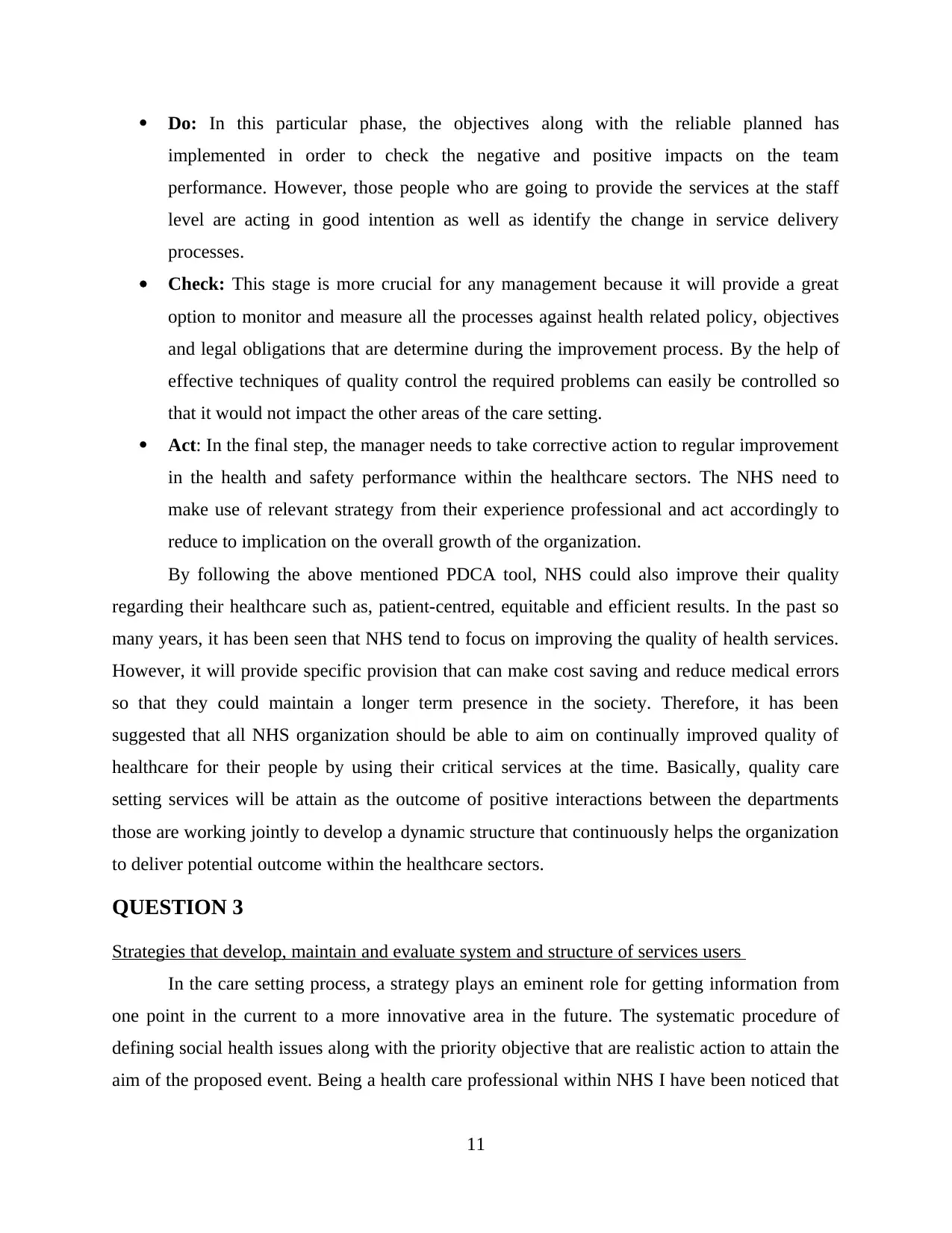
Do: In this particular phase, the objectives along with the reliable planned has
implemented in order to check the negative and positive impacts on the team
performance. However, those people who are going to provide the services at the staff
level are acting in good intention as well as identify the change in service delivery
processes.
Check: This stage is more crucial for any management because it will provide a great
option to monitor and measure all the processes against health related policy, objectives
and legal obligations that are determine during the improvement process. By the help of
effective techniques of quality control the required problems can easily be controlled so
that it would not impact the other areas of the care setting.
Act: In the final step, the manager needs to take corrective action to regular improvement
in the health and safety performance within the healthcare sectors. The NHS need to
make use of relevant strategy from their experience professional and act accordingly to
reduce to implication on the overall growth of the organization.
By following the above mentioned PDCA tool, NHS could also improve their quality
regarding their healthcare such as, patient-centred, equitable and efficient results. In the past so
many years, it has been seen that NHS tend to focus on improving the quality of health services.
However, it will provide specific provision that can make cost saving and reduce medical errors
so that they could maintain a longer term presence in the society. Therefore, it has been
suggested that all NHS organization should be able to aim on continually improved quality of
healthcare for their people by using their critical services at the time. Basically, quality care
setting services will be attain as the outcome of positive interactions between the departments
those are working jointly to develop a dynamic structure that continuously helps the organization
to deliver potential outcome within the healthcare sectors.
QUESTION 3
Strategies that develop, maintain and evaluate system and structure of services users
In the care setting process, a strategy plays an eminent role for getting information from
one point in the current to a more innovative area in the future. The systematic procedure of
defining social health issues along with the priority objective that are realistic action to attain the
aim of the proposed event. Being a health care professional within NHS I have been noticed that
11
implemented in order to check the negative and positive impacts on the team
performance. However, those people who are going to provide the services at the staff
level are acting in good intention as well as identify the change in service delivery
processes.
Check: This stage is more crucial for any management because it will provide a great
option to monitor and measure all the processes against health related policy, objectives
and legal obligations that are determine during the improvement process. By the help of
effective techniques of quality control the required problems can easily be controlled so
that it would not impact the other areas of the care setting.
Act: In the final step, the manager needs to take corrective action to regular improvement
in the health and safety performance within the healthcare sectors. The NHS need to
make use of relevant strategy from their experience professional and act accordingly to
reduce to implication on the overall growth of the organization.
By following the above mentioned PDCA tool, NHS could also improve their quality
regarding their healthcare such as, patient-centred, equitable and efficient results. In the past so
many years, it has been seen that NHS tend to focus on improving the quality of health services.
However, it will provide specific provision that can make cost saving and reduce medical errors
so that they could maintain a longer term presence in the society. Therefore, it has been
suggested that all NHS organization should be able to aim on continually improved quality of
healthcare for their people by using their critical services at the time. Basically, quality care
setting services will be attain as the outcome of positive interactions between the departments
those are working jointly to develop a dynamic structure that continuously helps the organization
to deliver potential outcome within the healthcare sectors.
QUESTION 3
Strategies that develop, maintain and evaluate system and structure of services users
In the care setting process, a strategy plays an eminent role for getting information from
one point in the current to a more innovative area in the future. The systematic procedure of
defining social health issues along with the priority objective that are realistic action to attain the
aim of the proposed event. Being a health care professional within NHS I have been noticed that
11
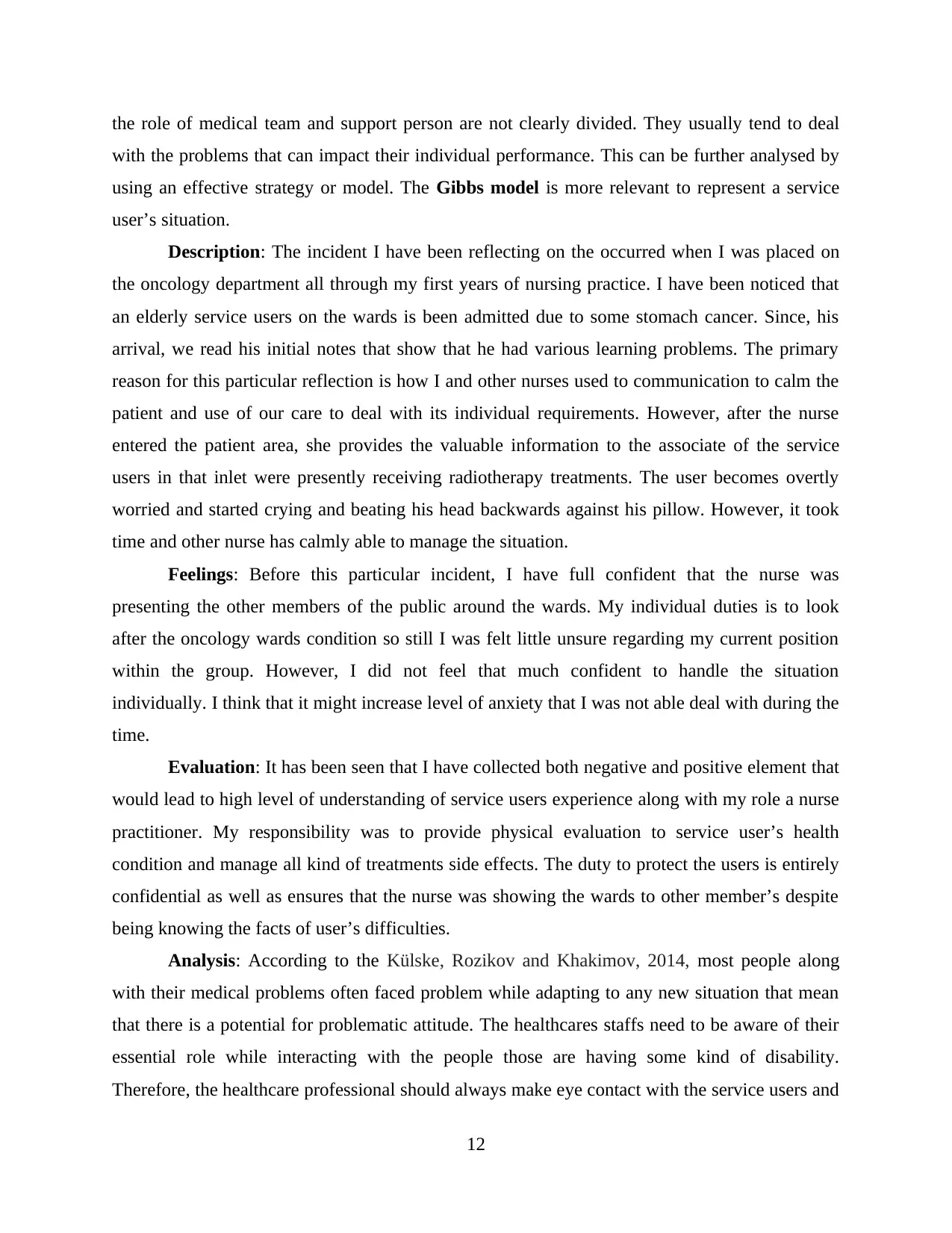
the role of medical team and support person are not clearly divided. They usually tend to deal
with the problems that can impact their individual performance. This can be further analysed by
using an effective strategy or model. The Gibbs model is more relevant to represent a service
user’s situation.
Description: The incident I have been reflecting on the occurred when I was placed on
the oncology department all through my first years of nursing practice. I have been noticed that
an elderly service users on the wards is been admitted due to some stomach cancer. Since, his
arrival, we read his initial notes that show that he had various learning problems. The primary
reason for this particular reflection is how I and other nurses used to communication to calm the
patient and use of our care to deal with its individual requirements. However, after the nurse
entered the patient area, she provides the valuable information to the associate of the service
users in that inlet were presently receiving radiotherapy treatments. The user becomes overtly
worried and started crying and beating his head backwards against his pillow. However, it took
time and other nurse has calmly able to manage the situation.
Feelings: Before this particular incident, I have full confident that the nurse was
presenting the other members of the public around the wards. My individual duties is to look
after the oncology wards condition so still I was felt little unsure regarding my current position
within the group. However, I did not feel that much confident to handle the situation
individually. I think that it might increase level of anxiety that I was not able deal with during the
time.
Evaluation: It has been seen that I have collected both negative and positive element that
would lead to high level of understanding of service users experience along with my role a nurse
practitioner. My responsibility was to provide physical evaluation to service user’s health
condition and manage all kind of treatments side effects. The duty to protect the users is entirely
confidential as well as ensures that the nurse was showing the wards to other member’s despite
being knowing the facts of user’s difficulties.
Analysis: According to the Külske, Rozikov and Khakimov, 2014, most people along
with their medical problems often faced problem while adapting to any new situation that mean
that there is a potential for problematic attitude. The healthcares staffs need to be aware of their
essential role while interacting with the people those are having some kind of disability.
Therefore, the healthcare professional should always make eye contact with the service users and
12
with the problems that can impact their individual performance. This can be further analysed by
using an effective strategy or model. The Gibbs model is more relevant to represent a service
user’s situation.
Description: The incident I have been reflecting on the occurred when I was placed on
the oncology department all through my first years of nursing practice. I have been noticed that
an elderly service users on the wards is been admitted due to some stomach cancer. Since, his
arrival, we read his initial notes that show that he had various learning problems. The primary
reason for this particular reflection is how I and other nurses used to communication to calm the
patient and use of our care to deal with its individual requirements. However, after the nurse
entered the patient area, she provides the valuable information to the associate of the service
users in that inlet were presently receiving radiotherapy treatments. The user becomes overtly
worried and started crying and beating his head backwards against his pillow. However, it took
time and other nurse has calmly able to manage the situation.
Feelings: Before this particular incident, I have full confident that the nurse was
presenting the other members of the public around the wards. My individual duties is to look
after the oncology wards condition so still I was felt little unsure regarding my current position
within the group. However, I did not feel that much confident to handle the situation
individually. I think that it might increase level of anxiety that I was not able deal with during the
time.
Evaluation: It has been seen that I have collected both negative and positive element that
would lead to high level of understanding of service users experience along with my role a nurse
practitioner. My responsibility was to provide physical evaluation to service user’s health
condition and manage all kind of treatments side effects. The duty to protect the users is entirely
confidential as well as ensures that the nurse was showing the wards to other member’s despite
being knowing the facts of user’s difficulties.
Analysis: According to the Külske, Rozikov and Khakimov, 2014, most people along
with their medical problems often faced problem while adapting to any new situation that mean
that there is a potential for problematic attitude. The healthcares staffs need to be aware of their
essential role while interacting with the people those are having some kind of disability.
Therefore, the healthcare professional should always make eye contact with the service users and
12
⊘ This is a preview!⊘
Do you want full access?
Subscribe today to unlock all pages.

Trusted by 1+ million students worldwide
1 out of 15
Related Documents
Your All-in-One AI-Powered Toolkit for Academic Success.
+13062052269
info@desklib.com
Available 24*7 on WhatsApp / Email
![[object Object]](/_next/static/media/star-bottom.7253800d.svg)
Unlock your academic potential
Copyright © 2020–2026 A2Z Services. All Rights Reserved. Developed and managed by ZUCOL.





